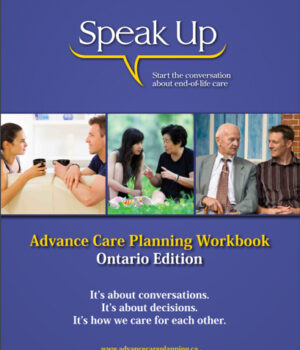RENFREW COUNTY (Pembroke) — In past practice, an individual with a life-limiting illness would be actively treated until no more could be done, at which point they would be classified as “palliative” and cared for with comfort measures while awaiting death.
However, over the last five to 10 years, medical professionals have recognized that a sudden shift to “palliative care” wasn’t the best approach, and wasn’t of benefit to the patient or the individual’s family. Instead, they have learned that, in certain situations, it is best to take an earlier palliative approach to care and treat the patient holistically.
“Integrating palliative care early is a culture shift that our team has been promoting and practicing for many years now,” said Nurse Consultant Erin McCabe of the Champlain Regional Palliative Consultation Team. “We know that the medical research tells us patients have better outcomes with respect to comfort both physically and emotionally when a palliative care approach is initiated early on in the illness trajectory. We see the benefits in our day to day practice as well,” she said.
For example, a person with advanced COPD (Chronic Obstructive Pulmonary Disease) may be struggling physically with shortness of breath, have financial concerns related to being off work, and their loved one(s) may be getting burned out caring for the person and maintaining the household.
When treated with a palliative approach to care that includes a holistic assessment, Ms. McCabe said it may be determined that this person requires medication adjustments or additions, access to palliative volunteers to allow the caregiver time to leave the house to run errands or for leisure time, and this person might need personal support services to help with personal care if he or she isn’t able to do this independently. All of these work to improve a person’s quality of life which will allow that person to live the best they can until the time of their death.
“A palliative approach to care is totally patient-centred and it enables individuals to have both an opportunity and time to prepare for death – financially, emotionally and spiritually, as well as preparing their families. It allows patients to be in control of things as much as possible,” said Dr. Declan Rowan, a hospitalist at the Pembroke Regional Hospital who has a strong interest in palliative and end-of-life care and is a strong advocate for both in the region.
Conversations on this matter between a patient, a physician and sometimes the substitute decision maker are often initiated around the time of diagnosis of a life-limiting illness and cover such aspects as the incurable and/or progressive nature of the illness, the medical care plan and the individual’s wishes, values and goals which are often part of advance care planning.
He noted that palliative care has become a priority topic for healthcare organizations in the last year or two, especially since Health Quality Ontario developed a set of guidelines for the revised approach.
“There are now a lot of tools available to clinicians that help with early identification of those who would be best suited to a palliative approach to care – often those who are older and living with two or more life-limiting medical issues such as cancer, congestive heart failure, COPD, dementia or Parkinson’s,” Dr. Rowan said, adding that a palliative approach to care is not about “giving up”.
Dr. Rowan cited another example in which an individual is living with heart failure – a chronic, life-limiting illness which, while possible, is actively treated. The reality, however, he said, is that a patient with this condition will get more symptomatic, more weak and more frail over time. “In the palliative approach to care, we treat the shortness of breath and mobility difficulties, but at the same time we speak about what’s important to the patient – what are their end-of-life goals, what are their wishes and what are their values,” he said.
In some cases, patients value their independence and don’t want to end up back in hospital – they want to stay at home. Others may have a goal in mind, like being able to attend a special function like a grandchild’s wedding.
“The palliative approach to care enables the start of conversations like this with family and a patient’s family physician so that in the end, their wishes and valued are respected,” Dr. Rowan said. In fact, he said, having a conversation with family about advance care planning is something that everyone should do, regardless or age or health status. Advance care planning is all about preparing a guide for an individual’s substitute decision maker that will assist when the time comes to need it.
“This has nothing to do with Advance Directives – or the decision to resuscitate or not,” Dr. Rowan said. “It’s a fact that in the last two weeks of life, 90% of decisions about an individual are made by somebody else and it’s important that that decision maker knows and understands your values, wishes and care goals.”
Since implementing the palliative approach to care, Dr. Rowan said that feedback from patients and families has been good. “Earlier palliative care has been shown to improve quality of life, reduce psychological distress and allow patients to make better care decisions, [which] are consistent with the patient’s prognosis and goals of care.”
Dr. Scott Murray who recently retired from urology and transitioned into the provision of palliative care in the community noted that palliative care has become more than just a treatment of the symptoms of terminal illness. “It’s about caring for the dying and their family and loved ones. At some point, we all accept death’s inevitability…palliative care is part of the journey to that end.”
Speak Up Ontario is a complete advance care planning workbook that is available online free of charge.







![Kenopic/Smith Auction [Paid Ad]](https://whitewaternews.ca/wp-content/uploads/2018/10/advertising-100x75.jpeg)

